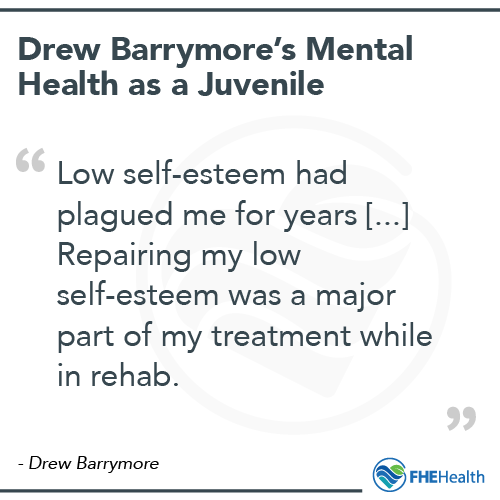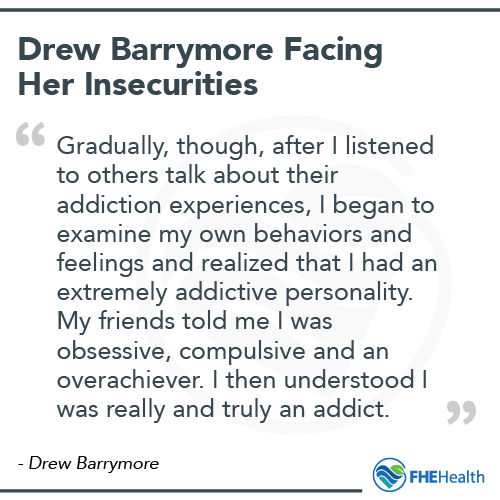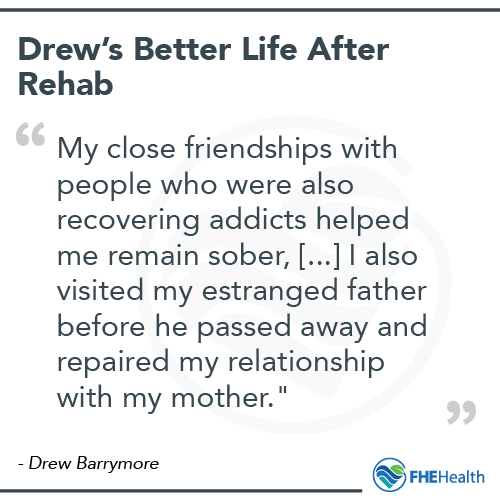
Best known for her role as the little girl Gertie in the Spielberg classic E.T. the Extraterrestrial, Drew Barrymore later endured a childhood and adolescence scarred by alcohol and drug abuse, depression and suicidal ideation. Today, she is a successful and sober author, actress and businesswoman who talks openly about her addictions and troubled relationship with her mother.
Overnight Stardom Leads to Overnight Substance Addictions
 At just nine years old, Drew Barrymore became one of the most sought-after and recognizable film stars in the world. Unfortunately, her mother, Jade, did not provide the parental guidance necessary for Drew to cope with fame and instant wealth. Jade allowed Drew to hang out nightly with her at Studio 54, the notorious New York City dance club known for its drug-abusing, wild-living clientele.
At just nine years old, Drew Barrymore became one of the most sought-after and recognizable film stars in the world. Unfortunately, her mother, Jade, did not provide the parental guidance necessary for Drew to cope with fame and instant wealth. Jade allowed Drew to hang out nightly with her at Studio 54, the notorious New York City dance club known for its drug-abusing, wild-living clientele.
In Drew’s autobiography Little Girl Lost, published in 1990 when she was sixteen, Drew says she started drinking alcohol at age nine, began smoking pot regularly by age 10 and was addicted to cocaine by age 12. She entered a rehab center when she was 13 and tried to commit suicide at 14 by cutting her wrists.
In a 2010 interview, Drew said she just wanted sympathy and attention at this point in her life. “I didn’t want to die. But I did want to get away from my mother.” Her legal emancipation from Jade brought Drew a frenzy of unwanted media attention. At 15, Drew petitioned a juvenile court, won her emancipation from her mother and moved into an apartment by herself.
“Low self-esteem had plagued me for years,” Drew wrote in her autobiography. “Repairing my low self-esteem was a major part of my treatment while in rehab.”
Little Girl Lost in Drug Rehab
Drew entered substance abuse therapy and treatment for the second time as a young teenager. One of her counselors during this period, Betty Wyman, describes Drew as “so sick, so sick” when she first met her. Wyman says her mother could not cope with Drew’s psychological problems and drug abuse because Jade “did not know or understand what was happening to Drew.”
 Drew describes rehab as highly structured. Everyone was awakened at 7:30, went to school from 9 am to 12 pm, had group therapy, counseling, group therapy, dinner and then participated in therapy groups with other patients and families. She explains that in the beginning, she thought it was a “joke” to refer to herself as an alcoholic or drug addict during group meetings.
Drew describes rehab as highly structured. Everyone was awakened at 7:30, went to school from 9 am to 12 pm, had group therapy, counseling, group therapy, dinner and then participated in therapy groups with other patients and families. She explains that in the beginning, she thought it was a “joke” to refer to herself as an alcoholic or drug addict during group meetings.
“I did not take it seriously put on a fake front,” Drew remembers. “Gradually, though, after I listened to others talk about their addiction experiences, I began to examine my own behaviors and feelings and realized that I had an extremely addictive personality. My friends told me I was obsessive, compulsive and an overachiever. I then understood I was really and truly an addict.”
Facing Buried Emotions
One of the most frightening things Drew said she had to do in rehab was confront new and overwhelming emotions. Being drunk and high all the time had suppressed feelings of low self-esteem, resentment and bitterness towards her mother for not providing the guidance she craved and needed.
“It was terrifying to come face-to-face with feelings that I had pushed away with alcohol and drugs,” she said. “There is a temptation to think once you have completed a treatment program, you are completely recovered. The truth is— you are never fully recovered. You must learn how to cope with problems that fuel and intensify your disease after leaving rehab.”
Addiction as a Genetic Disease – Drew Barrymore and Her Family Heritage
Much research evidence indicates alcoholism and drug addiction carries a strong genetic component. This is particularly relevant to Drew Barrymore’s troubles with addiction at such an early age. Her grandfather is the famous actor John Barrymore, one of the most popular silent movie stars of the 1920s. Always a heavy drinker, John Barrymore failed to make the transition from silent movies to sound movies because of his high-pitched and somewhat feminine voice. As his stardom faded, so did his health. In 1942, at the age of 60, Barrymore died of kidney failure, cirrhosis of the liver and other complications of alcoholism.
Drew’s Aunt Diana Barrymore (daughter of John Barrymore) also suffered from drug and alcohol addiction throughout her life. She made a few movies in the 40s, but her addiction ruined her chance at a successful career. Diana Barrymore died from a drug overdose in 1960.
Scientists believe a person’s struggles with addiction can be genetically inherited, although no one gene is responsible. Instead, substance addiction involves the interaction of multiple genes “triggered” by environmental factors. In fact, research results of genetics and addiction suggest that Drew’s genetic history potentially increased her risk for drug and alcohol addiction by as much as 60 percent.
Where Is Drew Barrymore Today?
 Following completion of several rehab programs before she was 16 years old, Drew said she maintained her sobriety by choosing sober friends and avoiding NYC nightlife, although she admits to drinking socially. “My close friendships with people who were also recovering addicts helped me remain sober,” she has said in numerous interviews. “I also visited my estranged father before he passed away and repaired my relationship with my mother.”
Following completion of several rehab programs before she was 16 years old, Drew said she maintained her sobriety by choosing sober friends and avoiding NYC nightlife, although she admits to drinking socially. “My close friendships with people who were also recovering addicts helped me remain sober,” she has said in numerous interviews. “I also visited my estranged father before he passed away and repaired my relationship with my mother.”
Drew’s story has a happy ending because she came to understand how recovery is a lifestyle and that relapse is possible if you don’t consciously make an effort to avoid people or situations that can trigger the urge to use again. However, Drew’s ability to have an occasional drink and not relapse is definitely not exclusive to most recovering addicts. For many people who come to FHE Health, successful sobriety requires total abstinence from drug or alcohol use. Drew’s approach to addiction simply won’t work for many people with bona fide substance addictions.
Celebrities who share their addiction and recovery stories without holding back offer encouragement, insight, and support to anyone struggling with an addiction. They are frank about acknowledging their addictive behaviors, their thoughts about refusing to admit their addiction and how their experiences in a rehabilitation program helped them understand why addiction is a medical disease and not a choice. Relapse happens, but that doesn’t mean you can’t get right back to working on your recovery.
Find Lasting Recovery with FHE’s Addiction Treatment Services
FHE provides comprehensive addiction treatment services that can help you or a loved one achieve recovery and sobriety. Call today to learn more about our programs.






